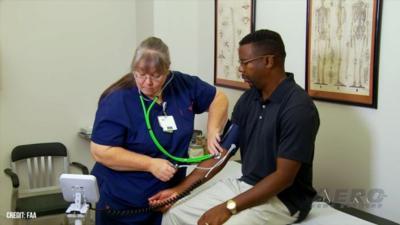Tue, Jul 01, 2025
Former Airline Pilot Comes Forward After Being Denied a Medical
A D.C. Circuit Judge is ordering the FAA to explain itself after a former airline pilot was denied a medical without receiving any true rationale for the decision. The disqualifying medication, Remeron, seems to carry the same drowsiness-related risks as other antidepressants that the agency takes on a case-by-case basis.

At the center of the case is Michael Solondz: a veteran airline pilot with nearly 20 years of commercial flying experience. After stepping away from the cockpit due to anxiety, Solondz tried Lexapro, an FAA-approved antidepressant, but experienced side effects like dizziness. His doctor switched him to Remeron, which he took at night and tolerated well. When he reapplied for his first-class medical certificate, the FAA denied his request solely based on the use of Remeron, despite Solondz submitting multiple medical evaluations showing no side effects or cognitive impairment.
The FAA’s so-called justification was a single 1998 study suggesting Remeron might impair driving after 16 days of use. Never mind that FAA-approved antidepressants like SSRIs also carry drowsiness risks, yet still earn case-by-case evaluation by regulators. The court, in no uncertain terms, said that the disconnect needs to be addressed.

“The difficulty is that, whereas the Federal Aviation Administration conditionally approved Lexapro, it has categorically disallowed pilots to fly while treated with mirtazapine,” wrote Judge Cornelia Pillard. “The agency must reasonably explain its actions. It has not done so here. The agency has failed to explain why it categorically disallows medical certification to all pilots who take the medication that Solondz was prescribed and finds beneficial.”
The FAA also cited unrelated and inconsistently applied health concerns like sleep apnea and a decades-old atrial fibrillation incident as reasons for denial, raising more questions than answers. The court remanded the case, ordering the FAA to provide a reasoned, evidence-based explanation.
More News
He Attempted To Restart The Engine Three Times. On The Third Restart Attempt, He Noticed That Flames Were Coming Out From The Right Wing Near The Fuel Cap Analysis: The pilot repor>[...]
Make Sure You NEVER Miss A New Story From Aero-News Network Do you ever feel like you never see posts from a certain person or page on Facebook or Instagram? Here’s how you c>[...]
From 2009 (YouTube Edition): Leading Air Show Performers Give Their Best Advice for Newcomers On December 6th through December 9th, the Paris Las Vegas Hotel hosted over 1,500 air >[...]
Aero Linx: NASA ASRS ASRS captures confidential reports, analyzes the resulting aviation safety data, and disseminates vital information to the aviation community. The ASRS is an i>[...]
“For our inaugural Pylon Racing Seminar in Roswell, we were thrilled to certify 60 pilots across our six closed-course pylon race classes. Not only did this year’s PRS >[...]
 NTSB Final Report: Rutan Long-EZ
NTSB Final Report: Rutan Long-EZ ANN FAQ: Turn On Post Notifications
ANN FAQ: Turn On Post Notifications Classic Aero-TV: ICAS Perspectives - Advice for New Air Show Performers
Classic Aero-TV: ICAS Perspectives - Advice for New Air Show Performers ANN's Daily Aero-Linx (06.28.25)
ANN's Daily Aero-Linx (06.28.25) Aero-News: Quote of the Day (06.28.25)
Aero-News: Quote of the Day (06.28.25)




